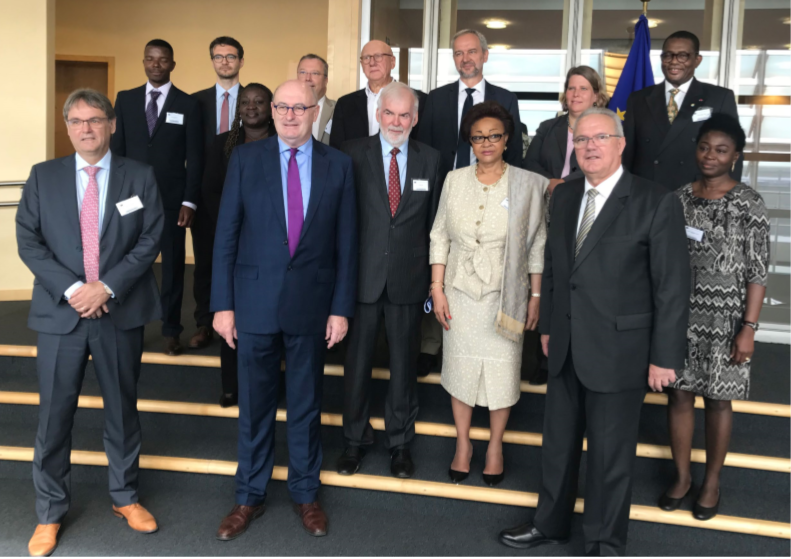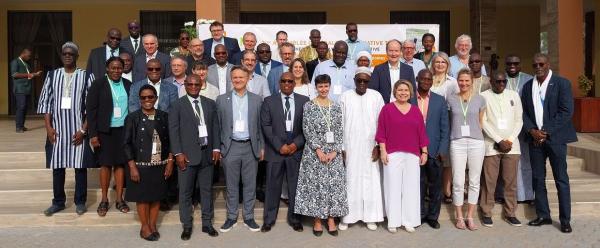Institutional news 3 April 2024
- Home
- Press area
- Press releases
- Putting agricultural cooperation at the heart of relations between the EU and the AU
Putting agricultural cooperation at the heart of relations between the European Union and the African Union

Africa faces many challenges, including one major one: how to offer decent jobs to the 800 million young people who will double the size of the labour market within 30 years, in a context in which the population will remain primarily rural. To solve this challenge, the final report from the Task Force Rural Africa, a group of eleven experts including Bruno Losch, a political economist working for CIRAD, pinpoints four areas.
Four strategic areas for action
1. A territorial approach for income and job creation
The report advocates a territorial approach to development. "Development policy has traditionally taken a much too sector-based approach", Bruno Losch explains, "in "silos": agriculture, cities, education, industry, health, etc. But people don't live in sectors; they live in places and territories. This is why a territorial approach is more appropriate: it helps us understand the problems facing people, farmers and businesses in the places where they live and work and tackle them more effectively." The Task Force highlights the benefit of increased public and private investment and the provision of basic services in medium-sized and small towns and rural areas, of strengthening the capacity of local people, notably women and youth, and empowering local, regional and national institutions.
2. Sustainable land and natural resources management, and climate action
Pressure on natural resources as a result of increased requirements and climate change is a major challenge for societies in Africa. The report highlights the need to include natural resources management support measures in sectorial policy and to build upon territorial dynamics associating local players and resource users. Promoting food systems that are both sustainable and resilient against the impacts of climate change is an appropriate response. The aim is to mobilize local resources and promote local businesses so as to link production, processing and distribution on a territory level.
3. Sustainable transformation of African agriculture
Acknowledging the wide diversity in agricultural situations among African countries, the experts propose building agricultural development strategies and models tailored to each context. To achieve rapid, inclusive agricultural growth, using and preserving the full potential of ecological resources, they favour a focus on family farming (and farmers' organizations), which "account for the vast majority of producers in Africa", according to Bruno Losch. The green revolution model is not sustainable. It cannot be reproduced, and technical systems tailored to global change, notably agro-ecology, must be promoted, through better coordination of research, training and innovation.
4. Development of the African food industry and food markets
To satisfy demand for jobs and generate greater added value while diversifying the rural economy, the Task Force recommends developing local and regional value chains and prioritizing agrifood processing. Making the African food industry more competitive will mean increasing private investment in the sector, by facilitating access to funding, and opening regional markets and supporting small local businesses.
Six key actions for a new Africa-Europe Alliance
The group of experts proposes a set of six short- and medium-term initiatives:
Action 1: Support rural governance and an innovative local action programme, based on a territorial approach
Action 2: Mainstream environmental sustainability and promote climate action
Action 3: Start a knowledge, innovation and networking initiative for transformation of agriculture and rural areas
Action 4: Improve access to private finance and to EU cooperation instruments for small and medium-sized agriculture and food businesses
Action 5: Scale up sustainable value chain development, regional integration and intra-regional trade
Action 6: Bring together European and African expertise for agriculture and rural development.
The European Commission will be monitoring and implementing several of these actions, including the immediate launch of a twinning and exchange programme between agricultural organizations in Europe and Africa, an AU-EU platform for agri-business, and innovation centres to support African agro-entrepreneurs.
Josefa Sacko, Commissioner for Agriculture of the African Union Commission, congratulated the Task Force on the report, which she feels shows that "farmers and the food industry are in it together and should work hand in hand to take on the new opportunities that the African Continental Free Trade Area will offer".
"It is up to us to come together, take these valuable recommendations forward and devise solutions that can deliver what we all want: a positive rural transformation, and an inclusive and sustainable agriculture and agri-food sector", said EU International Development Commissioner Neven Mimica (read the EC press release).


























